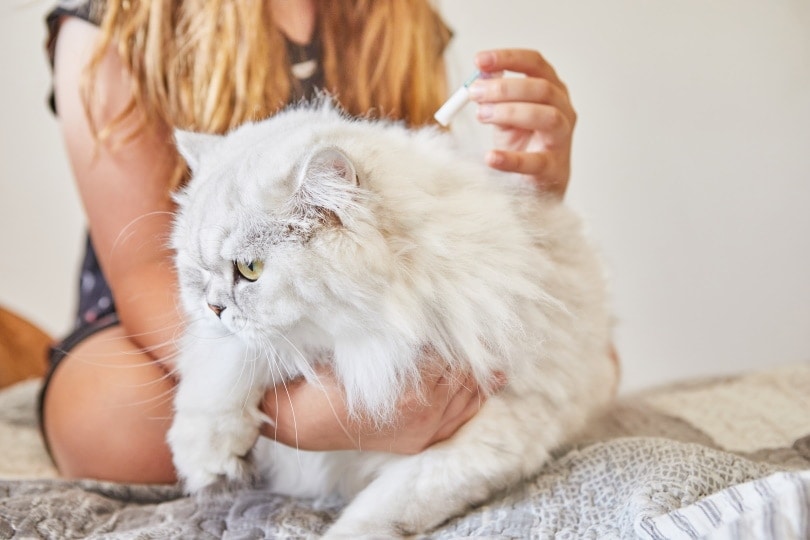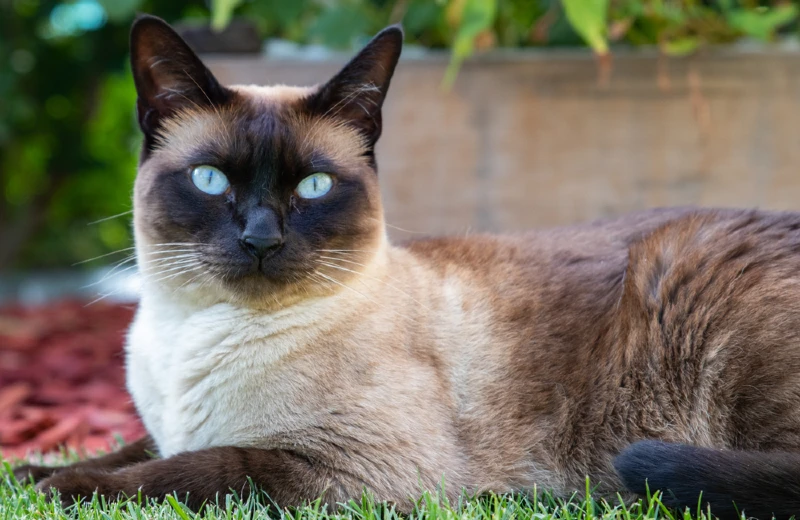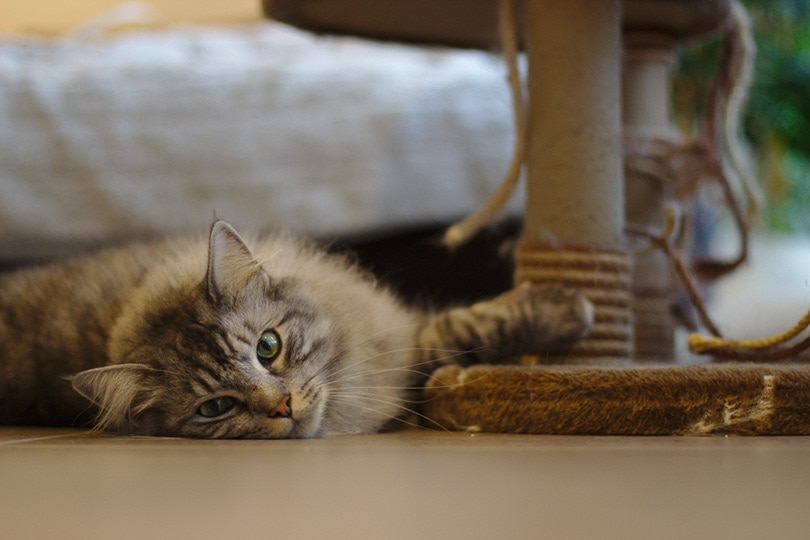Why Is My Elderly Cat Suddenly Pooping on the Floor? 10 Vet-Approved Reasons

Updated on
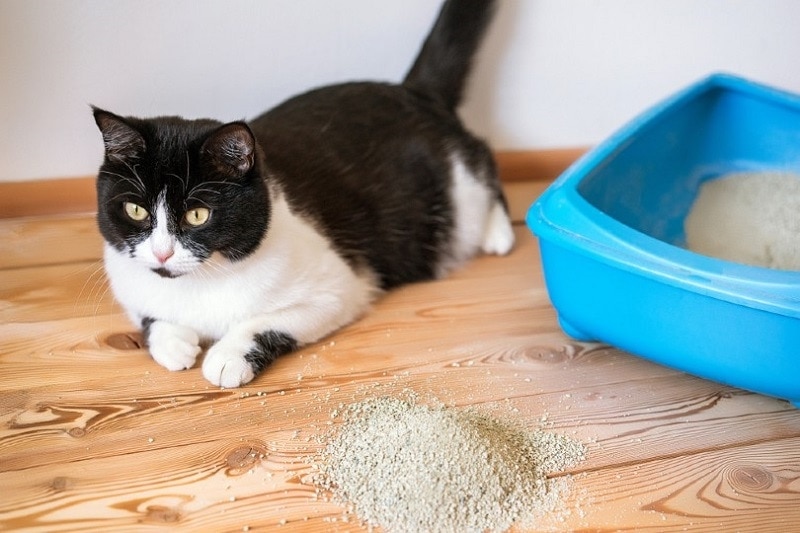
It can be distressing if your elderly cat suddenly starts pooping on the floor. The vast majority of cats are excellent at using their litter tray and are incredibly clean animals, so the chances are that if your elderly cat is soiling in the house, they’ll be just as distressed as you are about it.
Any change of behavior in your cat should always be checked by a vet, particularly with sudden house soiling, as this usually indicates a medical problem or illness that needs treatment rather than a cat “trying to get back at” their owner.
This behavior is a cry for help, and because cats are incredibly good at hiding health issues, it may be the only sign you get that your cat is unwell. Identifying the problem is the first step to remedying the issue, so read on to discover 10 possible reasons why your elderly cat is suddenly pooping on your floors.
The 10 Common Reasons Why Your Elderly Cat Is Suddenly Pooping on the Floor
1. Constipation or Diarrhea
Usually, it’s obvious if your cat didn’t make it to the litter box in time if they have diarrhea, as it’ll be on the floor close to the litter tray. Your cat may try to bury these spots of poop or act upset over them, so it’s best to clean it up as soon as possible. For dry poops, constipation can be a reason they’ll end up on the floor.
If your cat is constipated or has diarrhea, they will be in pain and significant discomfort when trying to poop. There is also urgency when it comes to diarrhea, meaning they may not have enough time to get to the box. Older cats suffering with arthritis may struggle to comfortably get in the litter box, which is why poop ends up outside of it. All of this can cause them to associate this pain with the litter box, making them not want to use it and forcing them to go elsewhere. They may also get some feces stuck to their bum, and may try to smear it off outside of the tray, leaving poop in several places.
Taking your cat to the vet to discern why they have diarrhea or constipation is the first step. Medication can help both conditions, and once your cat is on the mend, cleaning the floor with an enzymatic cleaner and cleaning their litter tray can help to encourage them to go back to using the tray when they’re feeling better.
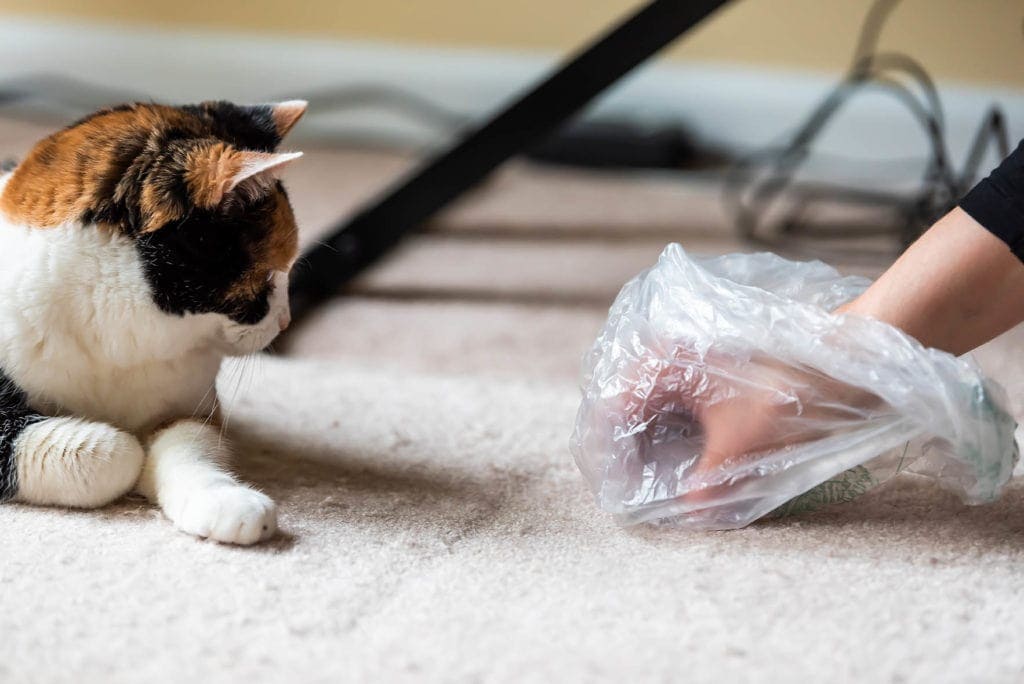
2. Urinary Issues
When cats have trouble peeing (such as when they have a urinary tract issue or a urinary blockage), it will cause them to strain when they attempt to pee for a long time and squat to pee small amounts more often. This amount of straining can cause them to poop accidentally. Also, it may be challenging in those instances to differentiate their posture to pee from one to poop. If you’re not sure if your cat is struggling to pee or poo, either way, they should be checked by your vet immediately.
The reason why cats may then urinate or defecate outside of the litter box is due to straining repeatedly, and often, they do not have enough time to get to their box but instead do it wherever they are. In addition, the urge to urinate is distressing, painful, and uncomfortable for your cat, so they might not use their litter tray as they associate the tray itself with this pain (similar to constipation). This means they may decide to try and pee somewhere else, such as in the bathtub.
If you find poop around the house, observe your cat for a while and see if they’re squatting to urinate often or make frequent (unfruitful) trips to the litter box.
If you suspect your cat has a UTI or is having trouble peeing, passing very little or no urine at all, or the urine is bloody, you should take them to the vet immediately. While it’s usually more common in young and middle-aged cats, older cats can suffer from urinary tract issues and blocked bladders, which can quickly become fatal if not treated. The vet will assess them and give them treatment to help them pee, reducing straining and stopping them from pooping around the house.
In case of a blocked bladder, your cat will need to stay at the vets, and have their bladder unblocked under sedation.
3. Hyperthyroidism
If your cat has issues with their thyroid gland, uncontrollable diarrhea can often be a sign of this. This condition is unfortunately common in middle-aged and older cats, and accidental pooping is often a result. However, other signs usually will occur alongside gastrointestinal problems with hyperthyroidism, which can help owners identify if their cat is unwell and seek treatment for them. Other signs your elderly cat may have hyperthyroidism include:
- Weight loss
- Excessive vocalizing and meowing
- Scruffy, greasy, and unkempt fur
- Vomiting
- Increased appetite
Veterinary treatment is the only way to prevent diarrhea caused by hyperthyroidism in your elderly cat. Lots of tender loving care and sticking to the vet’s prescribed treatment will help your cat feel better.
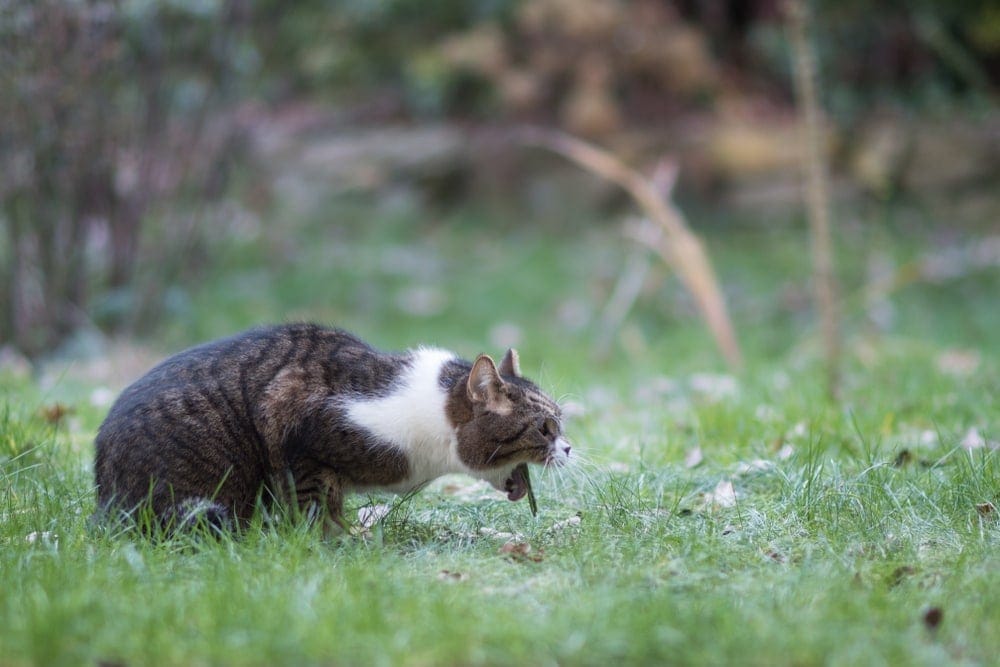
4. Dementia
Cats, like humans, can suffer from a cognitive decline in their old age. Feline cognitive decline has signs similar to dementia, causing changes in memory, forgetfulness, deterioration in senses, and decreased bowel control.
These signs may mean that your elderly cat has simply forgotten where their litter box is and can no longer hold their poop.
Medications from the vet can help to improve your cat’s cognitive function, and you can do a few things around the home to help them locate their litter tray. For example, keeping the litter box in the same place can help your cat to remember where it is. Daily routines can also help build your cat’s confidence, helping them find and use their tray more easily.
Transferring a small amount of dirty cat litter into their clean tray can further help your elderly cat find it, as they will be able to follow their noses to their toilet.
Lastly, placing puppy pads around the litter box can be helpful to catch any accidents in case your cat does find the litter box but forgets how to or struggles to get into it.
5. Litter Box and Litter
If you’ve recently changed the type of litter box you use, the type of litter inside it, or even the location of it, your elderly cat may not like the new changes.
Cats are creatures of habit and will want to urinate and defecate in private on clean litter where they feel safe. A litter box that is too large or too small can also deter your cat from using it. If it’s too small, it’ll be uncomfortable to use; if it is too large, they may not feel secure using it.
If your older cat is pooping outside the litter box, changing the litter type to a cat-approved option can encourage them to use it. If the tray has been moved to a new location (e.g., in a high-traffic area such as by the bathroom door), moving it back into a quiet place may also help your cat to feel safe when they need to go to the toilet. Remember that their litter tray should also be big enough for them to stand up comfortably and turn around.
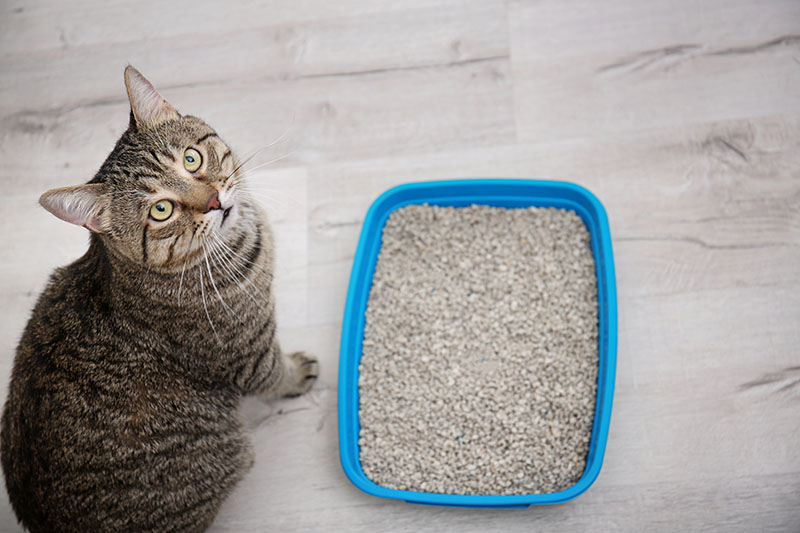
6. Arthritis and Mobility Problems
Elderly cats, in particular, can have problems getting in and out of a litter tray with high sides, as they often suffer from joint pain or conditions like arthritis, which can make using a high-sided box painful.
They may be pooping outside the box because it’s too painful to climb over the high sides of their litter box. Mobility problems and arthritis can also cause pain when getting into the “squatting” position cats use to pee and poop, which may also make them wary of the litter tray, as they associate the pain not with arthritis but with the container. This can make them poop around the house.
If you suspect your cat is in pain, take them to the vet. Effective pain relief paired with minor changes such as a box with lower sides and placement of the box in an easily accessed place (not upstairs, for example) will make a big difference to your cat.
These changes will allow them to regain independence and get to their box with little to no pain, letting them use it comfortably and keeping their feces off your floor.
7. Stress
Sometimes, cats react strongly to any changes in their environment, however small. Change is a big deal to many cats, particularly older ones, as the stress of it can have a significant impact on their behavior and health.
Some cats will be able to handle more stress than others, and some won’t be able to handle it at all and may end up pooping on the floor. Stressful situations can include:
- New cats in the home or around the home
- Noisy households
- A home move
- Furniture moved around the home
- The death of a companion or an owner
- New baby or visitors to the home
There are ways to reduce the stress your feline friend has to endure and ways to help them cope. Pheromone diffusers and sprays such as Feliway can create a calm environment for your cat, and paired with a space specifically made for them that helps them feel safe, can effectively reduce stress.
For example, a room (or part of one) away from busy areas that can be blocked off solely for your elderly cat is a fantastic way to reduce stress. This is particularly true if you provide them with lots of hiding places and even place their litter box in there with them.

8. Vision Problems and Blindness
Cats are good at locating essential places and resources, such as food and water bowls and litter boxes. However, if your elderly cat begins to lose their sight or goes blind over a shorter period of time, they may not be able to find these areas so easily at first and may be looking for so long that they have accidents or even get confused about where they are.
Because cats instinctively hide illness, you may not notice something wrong with their sight until the litter box is moved and an accident occurs.
Once a vet has examined your cat, they can establish if there is treatment that can help to slow down the loss of their vision or partially reverse it, depending on the cause. If, however, your cat has permanently lost their sight (which may occur in elderly cats due to certain medical conditions such as high blood pressure), replacing the litter tray where it was before you’ve moved it can help them reach it.
Leaving some dirty litter in a fresh tray can also help them find it by scent, and before long, your cat should be able to find it without a problem, as cats are good at navigating places they’re familiar with, even if they’ve lost their sight.
9. Not Enough Litter Boxes
If more than one cat resides in your home, but you only have one litter box, some territorial behavior may occur. The general rule of thumb for the number of litter boxes needed is “one litter tray for each cat in the home, plus one extra.”
This means that in a house with two cats, there should be three litter boxes; for three cats, there would be four, etc. Cats are solitary in nature and territorial, meaning that if there’s only one litter tray in the home, your elderly cat may be bullied out of or prevented from using it by another cat, leading to pooping accidents on the floor.
Placing the correct amount of cat trays around your home (in different places) can help to diffuse tension and reduce territorial behavior between your cats. This means each cat has their own “territory” and space to reside in, and it may even improve the relationship between your cats, reducing stress.
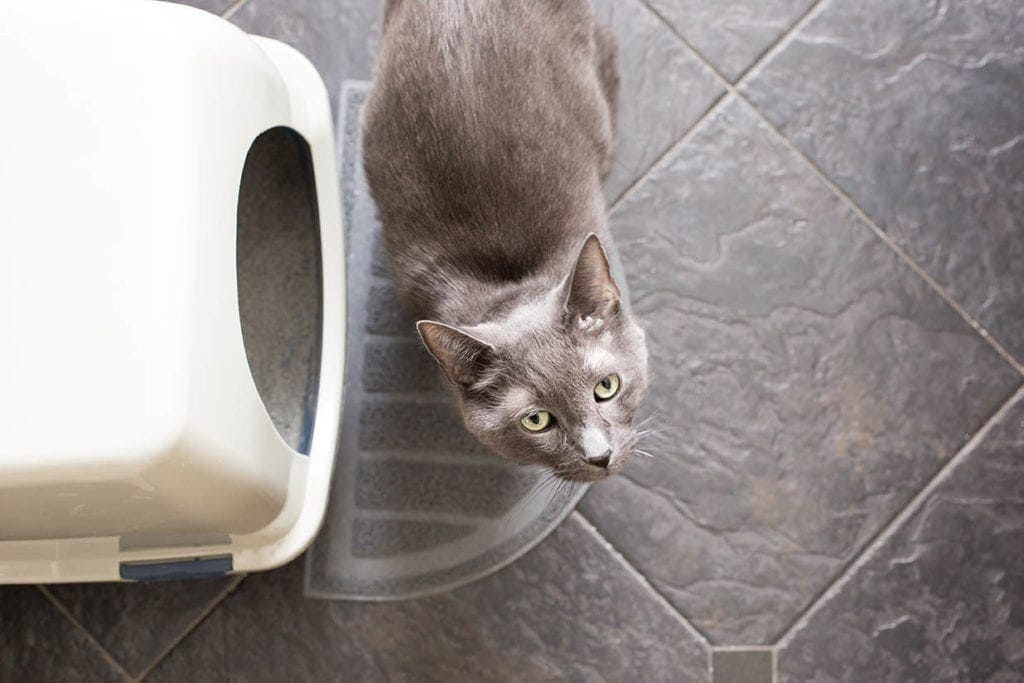
10. A Clean Litter Box
If your cat’s litter box is not cleaned out regularly, they may be opposed to using it and may not use it at all. Cats are fastidiously clean and won’t use a litter tray that’s smelly or filled with waste. This means they will have to go to other areas of the home, despite probably wanting to use their own kitty toilet.
We recommend cleaning your cat’s tray daily, scooping out any poop or pee, and adding a fresh layer of litter over the top. It’s good to dump it all and refill the litter tray at least once a week, and the whole tray should be deep cleaned with pet-safe, non-smelly disinfectant once a month to keep it fresh and clean.
Does My Cat Poop Around My Home to Annoy Me?
Remember that no cat will ever poop around the home or outside of their litter box to annoy or “get back at” their owners. If your old cat is pooping outside the litter box, there is likely a good reason for it, whether it’s a medical reason or otherwise, and this sudden change in toileting habits is sometimes the only sign that something is wrong with your cat, so it should be seen as a call for help.
 Conclusion
Conclusion
There are many reasons why your elderly cat may suddenly poop on the floor, and not all of them are health-related, but many are. A visit to the veterinarian can remedy most of the reasons we listed (such as diarrhea and arthritis) quickly and effectively. Finding the root cause of the problem is the fastest way to remedy it, and a few minor changes otherwise can make all the difference and keep you and your old cat happy.
See also:
- Do Cats Purr When They Are Nervous or Stressed?
- How to Stop a Cat From Peeing On the Carpet: 9 Expert Tips & Advice
Featured Image Credit: Tanya Plotnikova, Shutterstock


